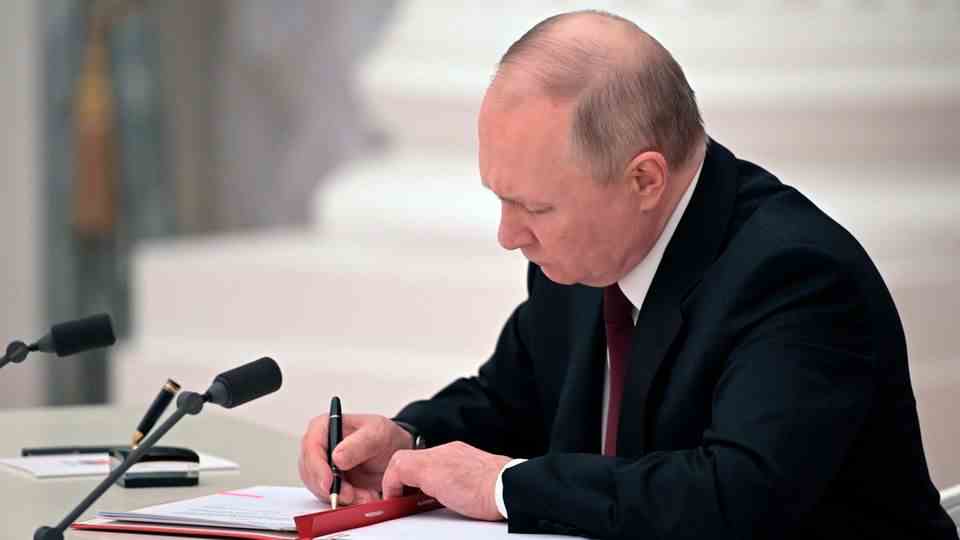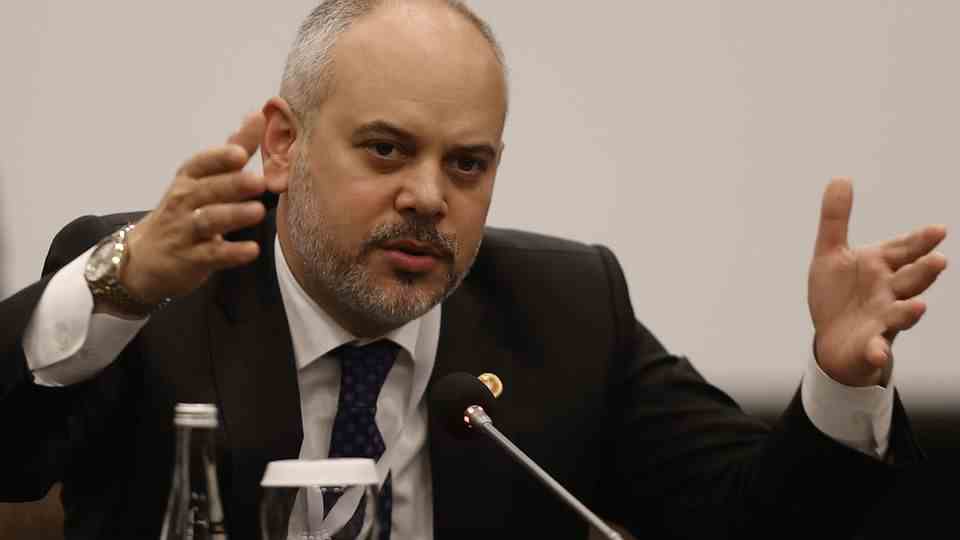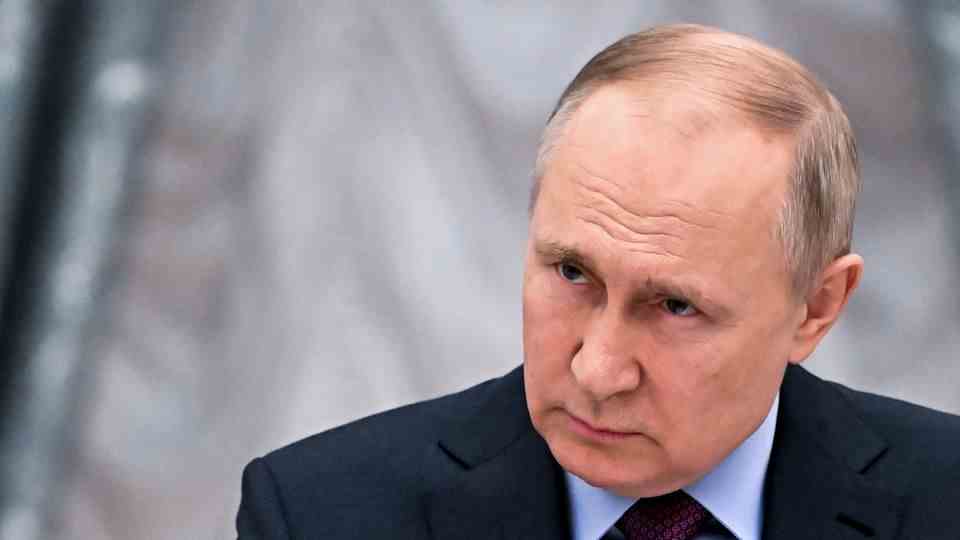We are here, we stand behind you: That was the message that was supposed to come from Joe Biden’s trip to Europe. Instead, an apparently improvised sentence by the US President comes into focus – and causes a great deal of excitement.
Joe Biden knows the weight of his words. “The words of a president matter”, he said in the presidential election campaign. A President’s words matter. They could send troops, bring peace, inspire, or incite. Not infrequently, the words were addressed to Donald Trump, whose often ill-considered statements once again became a burden.
A president’s words can also cause a stir, even if they can be counted on two hands, as Biden discovered Saturday.
His speech in the Polish capital of Warsaw was to be the conclusion and climax, an exclamation mark after his multi-day trip to Europe and the actual message: We are here. We stand by you. We, the USA, are on Europe’s side – in a “struggle between democracy and autocracy, between freedom and oppression,” as Biden said in front of the historic backdrop of the royal palace. There is war, but: “Fear not”. Pope John Paul II, who comes from Poland, already said that, and Biden also wanted to speak the reassuring words.
On the other hand, nine words with which Biden his 27-minute speech finished:
For God’s sake, this man cannot remain in power
For God’s sake, this man can’t stay in power. That man is Vladimir Putin, the warmonger from the Kremlin.
Biden probably just said out loud what many think: as long as a man like Putin is in power, Europe will not be able to live in peace. But the words of a US President carry weight. Especially when they are addressed to the Russian president, who also has an arsenal of nuclear weapons and could use any provocation as an opportunity to further escalate the war in Ukraine.
Nine words, multiple readings
Is the US President shaking the Russian President’s chair, even demanding his fall?
“No”, Biden taciturnly denied corresponding interpretations on Sunday. The White House had previously attempted to recapture the President’s words. “The President’s message was that Putin must not be allowed to have power over his neighbors or the region,” was the somewhat laborious explanation. US Secretary of State Antony Blinken also assured: “We are not pursuing a regime change strategy in Russia or anywhere else.”
The hasty reactions showed what potential explosive force the sentence was also attributed to in Washington. Taken literally, Biden’s remark, which US media says was not in the president’s speech transcript, deviates from the clear goal that has shaped weeks of wartime diplomacy: to defend Ukraine’s territorial integrity — and any move against Russia in accordance with the to go to European allies.
That, after all, was the message that Biden’s visit was meant to convey. He was the first US President to personally attend a regular EU summit in Brussels. It was a demonstrative and symbolic solidarity with the partners. That message has now faded into the background for nine words that the President appeared to have improvised in his speech.
“I wouldn’t use those kinds of words,” French President Emmanuel Macron said in a TV interview on Sunday when asked to comment on the speech. It is important to prevent “an escalation of words and actions” in the Ukraine war. Chancellor Olaf Scholz supported Biden and distanced himself from the interpretation that Putin should be overthrown: “We are both completely in agreement that ‘regime change’ is not an object or goal of the politics that we pursue together,” he said on Sunday evening in an interview with “Anne Will”. The British Government made a similar statement.
For Russia, Biden’s comment should be a gift. State propaganda portrays Washington as an imperialist tyrant, as the actual aggressor. A few days ago, the ex-president groaned Dmitry Medvedevthe US wanted to “destroy” Russia.
In a first statement on Biden’s comments, stressed Putin’s spokesman, Dmitry Peskov, therefore relishes the fact that the United States has no say in the leadership of Russia. “Biden does not decide that, the president of Russia is elected by the Russian people,” said Peskov. Russian parliament leader Vyacheslav Volodin commented on Telegram: “Biden is weak, sick and unhappy.” US citizens “should be ashamed of their president”.
Biden has so far left little doubt that he would welcome a change of power in the Kremlin. He has already described Putin as a “dictator,” “butcher,” and “war criminal,” and in his speech in Warsaw he swore to a “great fight for freedom” that could not be won in “days or months.” The possibly misunderstood demand for a fall could crown the confrontational course with the Kremlin ruler.
Joe Biden’s (actual) message
What does Putin want? Even after four weeks of Russian aggressive war, an answer is proving difficult. The decision to end the invasion seems to be made solely in the mind of the Kremlin ruler – a place that here as delusional and there as rapt is described, and so far seems to have refused all attempts at crisis diplomacy.
On the other hand, what should be certain is what Putin doesn’t want: fearing for his personal survival and believing that he could end up like the dictators Saddam Hussein or Muammar al-Gaddafi. It remains to be seen whether this will be an advantage or disadvantage in view of the further negotiations between Kyiv and Moscow, which could start on Monday or Tuesday. In any case, Putin obviously does not shy away from any escalation in order to still achieve his goals.
Biden’s sentence was “humanly understandable,” said US expert and political scientist Cathlyn Clüver Ashbrook ZDF. “I believe that many European heads of state feel the same way as the president.” Nevertheless, the statement was diplomatically unwise. Removing the head of the Russian Kremlin from office is “in no way” the explicit goal of the United States. “The goal of this trip and this President at this moment is to invoke Western unity to hold the Western alliance together.” Biden was successful overall, according to the expert.
In fact, it would probably be wrong to focus only on the pithy closing words of Biden’s roughly 27-minute speech. In Warsaw, the US President evoked the values of democracy, signaled that the US and Europe would also stand together on the big energy question, enlisted the support of the world public for Ukraine, and stretched out his hand to the Russian people: “You, the Russian People are not our enemies.”

But what sticks above all is this sentence: “For God’s sake, this man can’t remain in power.” Perhaps at some point in the history of the ideological conflict between the West and Russia he will rank behind John F. Kennedy’s “Ich bin ein Berliner” (1963) and Ronald Reagan’s call for “Tear down this wall” (1987).
The sentence was definitely heard and reverberates. Putin’s spokesman spoke again on Monday. “This is a statement that naturally causes concern,” said Peskow. “We are following the US President’s statements very closely. We are recording them meticulously and will continue to do so.”
The words of a US President have weight.




